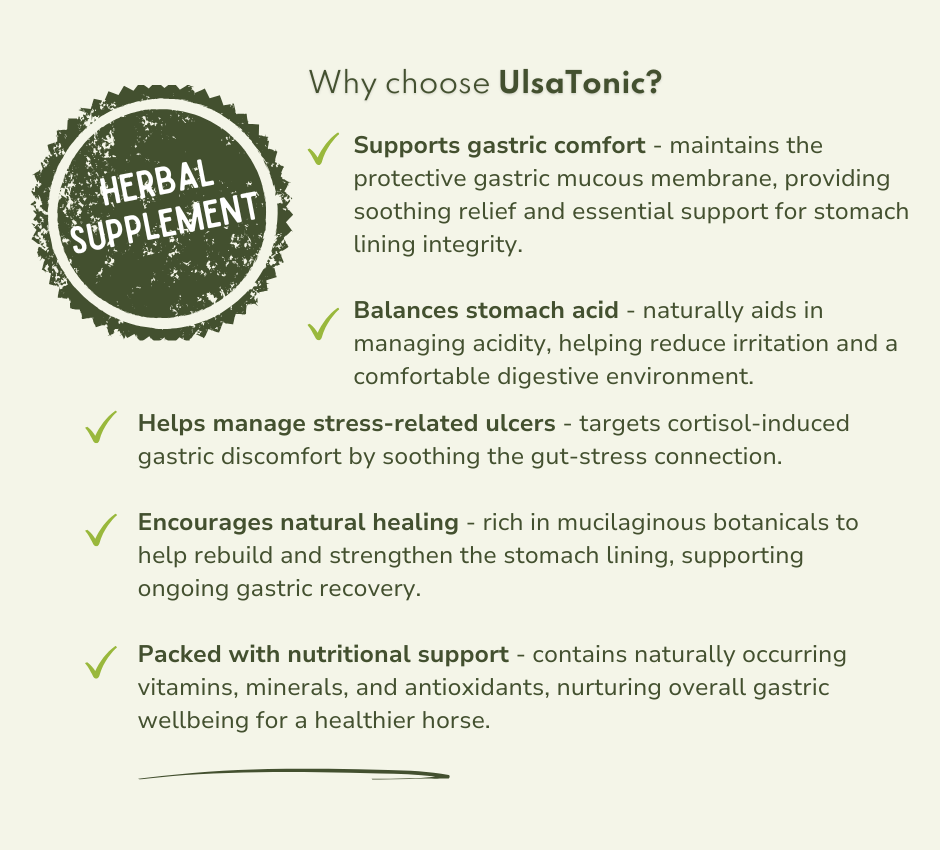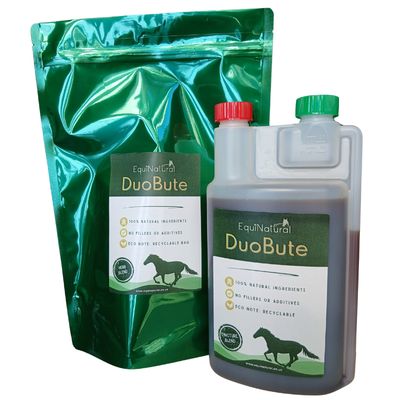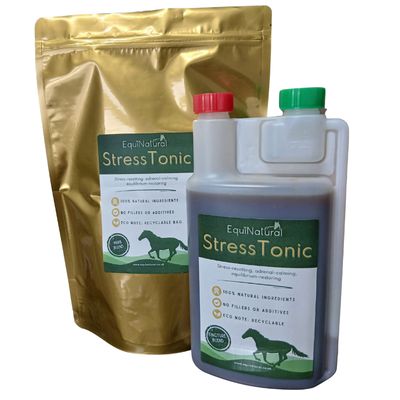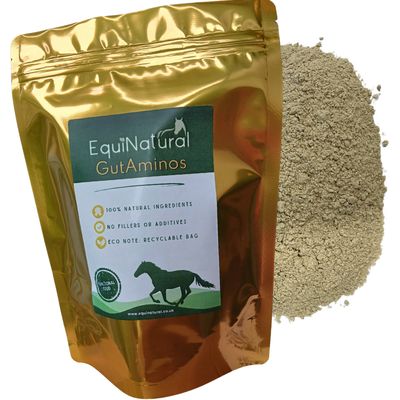ULSATONIC *Organic herbal blend for horses - stomach-soothing, acid-calming, mucosa-nourishing
With anti-ulcerogenic and mucilaginous properties, UlsaTonic is an effective blend of organic, regenerative phytonutrients, formulated to support the stomach's natural defences against equine gastric ulcers.
Each herb in UlsaTonic plays a vital role in nurturing the stomach’s natural defences, soothing irritation, and supporting mucosal integrity. This synergistic blend combines demulcent, adaptogenic, and antioxidant botanicals that help maintain a balanced gastric environment, calm acid sensitivity, and encourage comfortable digestion.
✨ “She’s gone from a raging monster to a sweet-natured, gentle mare. Completely transformed!”

Important Note
For horses with more significant gastric ulcers requiring pain/anti-inflammatory support, stress management, and intestinal repair, consider our comprehensive UlsaCOMBO . This 4-in-1 formula combines:
~ DuoBute
– for natural pain and anti-inflammatory support
~ StressTonic
– to help regulate the stress response
~ UlsaTonic
– for targeted gastric support
~ GutAminos
– to aid intestinal repair
Together, these supplements provide a complete gastric ulcer programme, tailored to support healing at all ulcerogenic grades.
Overview
Being a trickle-feeder a horse will stress if they run out of forage and have no means to find any more, which for the stabled horse can then lead to developing those well-known stable habits, i.e. weaving, wind-sucking, cribbing, box-walking et al.
Why? Because unlike us, when our stomachs are empty, our acid production stops, whereas a horse’s stomach constantly produces hydrochloric acid - they're a trickle-feeder for a very good reason. Under normal feeding habits, the acid is naturally absorbed into the continually eaten food and buffered by bicarb-containing (acid soothing) saliva. However, if they run out of forage and their stomach empties, the acid keeps on coming.
Without a continual forage supply, the intestinal lining in the stomach degrades. And without a strong protective mucosal gut lining in place, the continual acid splash will burn the fragile intestinal mucosa, creating a raw wound, aka an ulcer.
Meanwhile, the stress involved with both lack of forage and the ulcer pain now triggers the release of the stress hormone, cortisol.
This isn’t a situation you want to prolong as cortisol isn’t necessarily a friendly hormone; it’s fine for a perceived short-term threat because it has a vital protective job to do, but for a prolonged state of anxiety it not only permanently floods the body with acid, making the peripheral limbs feel like they’re on fire, but it also switches off several vital metabolic functions ( including
digestion), while suppressing immunity and increasing blood glucose levels.
Cue squamous stomach ulcers developing due to food disruption/quality, and glandular/pyloric ulcers which are caused by the stress/anxiety.
For the latest gastric ulcers insights and updates, see our main A-Z/Ulcers page for more info.
Is UlsaTonic Right for My Horse?
🌿 Ideal for horses who...
- Show signs of gastric discomfort such as girthiness, irritability when grooming, or a tucked-up appearance. Note: not right-hind discomfort - this is connected to hindgut dysbiosis.
- Are recovering post-omeprazole or other ulcer medication and need nutritional support for mucosal repair.
- Have a history of ulcers, especially during transitions such as box rest, diet change, or colder months.
⚠️ Not suitable for horses who...
- Are pregnant or nursing mares (some herbs have mild uterine or hormonal activity).
- Are competing under FEI rules while feeding Filipendula ulmaria (contains natural salicylic acid).
- Are already on prescription ulcer medication unless advised by a vet - introduce slowly once stable.
- Are being fed alongside NSAIDs or anticoagulants without guidance (herbal salicylates may increase their effect).
Which blend - UlsaTonic, UlsaCombo, or SiboCARE?
Each blend has a distinct role:
→ UlsaTonic
- For direct gastric support, soothing stomach acid sensitivity and nourishing the mucosa.
→ UlsaCOMBO
- For multi-level ulcer management, combining UlsaTonic with pain, stress, and intestinal repair support.
→ SiboCARE
- For hindgut dysbiosis resulting in gas/bloat.
If your horse struggles with stomach sensitivity or post-omeprazole rebound, UlsaTonic provides gentle, functional support to restore comfort and calm from within.
| IF YOUR HORSE... | BEST CHOICE |
|---|---|
| Shows mild stomach discomfort - girthy, irritable, tight | UlsaTonic |
| Needs support after omeprazole | UlsaTonic |
| Has known mild stomach ulcers | UlsaTonic |
| Has active ulcers with pain or stressed behaviour | UlsaCOMBO |
| Needs multi-level ulcer support | UlsaCOMBO |
| Has right-hind sensitivity, gas, or bloating | SiboCARE |
| Shows hindgut dysbiosis signs - tension, acidic droppings aroma | SiboCARE |
Composition & Feed Guide
UlsaTonic is a nutritional, functional food supplement and not veterinary medicine. For more on this, refer to Dr Kellon's article - Nutrition is not 'Alternative' Therapy .
Composition
Withania somnifera, Matricaria chamomilla, Symphytum officinale Folia, Trigonella foenum-graecum, Althea officinalis Radix, FIlipendula ulmaria, Mentha piperita, & Olea europaea
~ Glossary
- Withania somnifera – Adaptogenic root that helps buffer the physiological impact of stress, reducing cortisol-related acid surges while supporting adrenal and nervous system balance.
- Matricaria recutita/chamomilla – Gentle anti-inflammatory and antispasmodic herb known to soothe the gastric lining, ease tension, and support healthy digestive motility.
- Symphytum officinale Folia – Traditionally used for tissue regeneration; its allantoin content supports mucosal repair and renewal of the stomach’s epithelial cells. (Feed for limited durations of up to 4 weeks, with a break between courses.)
- Trigonella foenum-graecum – Rich in mucilage and amino acids, Fenugreek helps coat and protect the stomach wall, supporting the body’s natural anti-ulcer defences.
- Althaea officinalis Radix – Demulcent powerhouse that forms a soothing film over irritated mucosa, calming inflammation and promoting repair of the stomach lining.
- Filipendula ulmaria – Rich in natural salicylates with a natural affinity for the gut, helping to buffer stomach acid and support balanced digestive comfort. (Contains salicylic acid — a controlled substance under competition rules.)
- Mentha piperita – Cooling and carminative; helps relax the stomach’s smooth muscle, aiding comfort and reducing discomfort from trapped gas.
- Olea europaea – Antioxidant and anti-inflammatory; supports gut microbiome stability, strengthens the stomach’s natural resilience to oxidative stress, and is recognised for its anti-ulcerogenic action.
Feed Guide
🌿Dried Herb Blend
Human grade, produced to ecological standards and free from agro-chemicals. See our Quality page for Organic Certification Documents.
- Feed 5g/100kg bodyweight per day, i.e. 25g for a 500kg horse.
- 1 x level 15ml scoop = 6-grams
💧Tincture
- Feed 6ml/100kg bodyweight per day, i.e. 30ml for a 500kg horse.
Fussy Eater?
Horses can have their own opinions (and strong tastebuds!), so now and then a new blend might need a little extra encouragement. This doesn’t reflect the quality or efficacy of the product, but rather their natural instinct towards new flavours.
Check out our Fussy Eaters page, or send us a message - we've many helpful tips to make introducing new supplements easier.
Footnotes
- Laboratory tested for identification and compliance to the British and European Pharmacopoeia standards.
- Human grade.
- ♻️ Eco Note: Our packaging is recyclable and refillable.
- 🧊 Storage Tip: Keep cool and dry.
Clinical Considerations
Advisories
- If your horse is prone to chronic gastric ulcers or is on long-term proton pump inhibitors (e.g., omeprazole), introduce gradually and consult your vet regarding concurrent use.
- Always ensure quality meadow hay is available 24/7 to ensure the stomach never empties.
- Slippery Elm can also be fed as a soothing nutritive demulcent beneficial for the inflamed gastric mucous membrane. However, slippery elm is now an endangered species, which means it's eye-wateringly expensive. Psyllium and/or Linseed make for acceptable, and much more cost-effective, alternatives.
Contraindications
- Not suitable for pregnant or nursing mares without veterinary oversight (due to hormonal and uterine activity of certain herbs).
- Competition horses: Meadowsweet (Filipendula ulmaria) contains salicylic acid, a controlled substance under FEI rules - always check current regulations before competition use.
- Avoid concurrent use with NSAIDs or anticoagulant medications unless under veterinary supervision, as natural salicylates may enhance their effects.
Veterinary Reference / Formulary Extract
If you’re discussing this with your vet, you’re welcome to share our UlsaTonic Vet Reference extract with them.
© EquiNatural 2025. All content is original work protected under copyright, and may not be re-published, duplicated, or rewritten for commercial use without permission.





